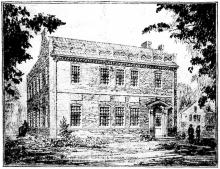Cuttyhunk now has the latest in telephone equipment. Islanders may even be listed in the directory next year, but at least one of its telephone problems isn’t yet solved. Getting ahold of town government takes a little luck and a lot of time.
A year ago, if a resident here wanted to call out, he had only to walk to the nearest of the seven pay stations, and, if that one of the two Island circuits wasn’t busy, crank the ringer handle to tell the operator in New Bedford he wanted to make a call.
In the summertime there might be a bit of a wait for an open line, and people out of town had a walk, no matter what time of year, but for the 50 or so winter residents it was ample, and for the 500 summer residents, adequate.
Early this year, the telephone company installed an eighth station near the powerhouse to take care of the recently built houses in that section of town, a 14 per cent increase in the number of stations, even if they were all still served by two circuits.
Incoming calls were a different matter. It is unlikely, but suppose a state official were to have found an answer to a question from Cuttyhunk. He would eventually get to the New Bedford operator who would ask him which of the pay phones he would like to have her ring. He wouldn’t know, so she would ring one number after another until she got an answer.
Suppose she rang the Boswell House or the Allen House, and suppose further that it was summertime so someone was standing on the porch to hear it. If that someone weren’t too caught up in the summer flurry, he might answer it - and even take a message. In a day or two, when he ran into Alpheus P. Tilton, selectman, the message would be delivered, and after a short wait for an open line, Mr. Tilton would call the official back and get the answer.
It might seem easier to write a letter, but many an envelope has arrived on Cuttyhunk bearing unmistakable signs that it shuttled through the better part of the Massachusetts postal system until some knowing (or desperate) worker scribbled, “Try the southwest corner” across the address.
The only things that seem to have no trouble finding Cuttyhunk are yachts which arrive there by the hundreds in the summer, and dead whales which show up in smaller numbers on the south shore.
The telephone cable across to Mishaum Point on the mainland was laid by the Coast Guard during the second World War. Except for its limited capacity, it has been serving satisfactorily. This week the telephone company completed installation of a “carrier system”, normally used only on major transmission lines. It consists of a coder and decoder at each end of the cable, and enables calls from all eight phones, separately, to be jammed together onto the two cable circuits, together, and then get properly separated again on the mainland. Potentially, it increases the island’s telephone capacity by a factor of four.
While they were at it, telephone company employees installed dial phones, and the appropriate equipment at each end of the line. It is now possible for a Cuttyhunk resident to dial Samoa just the way Vineyarders do, though it would take a pocketful of quarters.
Going the other way, it is now possible for that hypothetical state official to dial the Allen House pay station. And, the numbers of the pay stations will be listed in the New Bedford directory next year, although just how hasn’t been decided. The powerhouse station is called Cemetery Road by residents, but a telephone company spokesman says he doubts his firm will approve a listing like that. One alternative is to list all eight phones under a bold-faced “Cuttyhunk” legend, giving the location of each — at any rate, it will be there in the regular alphabetical section.
But the dial system still doesn’t solve the problem of catching up with town government. As one of the more active members of the government, Mr. Tilton has asked the telephone company to install a public phone on the street in front of his house, accessible to all, with an incoming-calls-only extension into his house where his wife, if not he himself, is likely to be nearby to answer.
There are two ways of achieving this. One is to install a ninth pay phone on the island, but the telephone company is not sure the cable can carry enough current to ring that many lines.
The other is to move one of the existing eight phones out of the residence where it now is, onto Mr. Tilton’s street. As a matter of fact, Mr. Tilton says, that phone used to be just across the street from his house, but when the owner moved the telephone company moved the phone with him. It’s one of two phones located in private houses.
The New Bedford office (which handles maintenances in Cuttyhunk) seems to understand the problem, but pay phones fall under the Public Telephone Department, located in Brockton. That department now has the request, but it’s geared to choosing pay phone sites on the basis of expectable use, and no one is arguing that Mr. Tilton’s front yard is the busiest section of town, even if it is just down the beach from the Fish Pier. Everyone is hoping the department will find a little public spirit in its character.



 1 comment
1 comment





Comments (1)
Comments